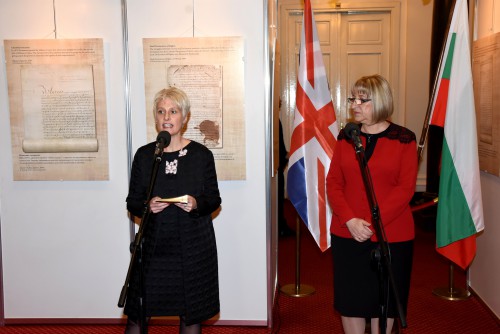19th June 2015 Sofia, Bulgaria
No One Is Above the Law

UK embassies around the world along with my Foreign Minister this week commemorate the 800 year anniversary since the sealing of Magna Carta in a tented encampment on the banks of the River Thames in 1215.
Magna Carta has become a strong British brand – over the centuries it has come to stand for much more than originally appeared on the face of the peace treaty between “bad” King John and the wealthy noblemen.
The lofty principles that it has come to symbolise are the kinds of things that in the words of Lord Bingham retain “the power to make the blood race”. The principle that no one is above the law.
800 years on – Magna Carta’s legacy continues to resonate worldwide.
Magna Carta inspired the first English body which would develop into today’s UK Parliament. It inspired and influenced the Founding Fathers of the United States, who drew on it for the Declaration of Independence and the Bill of Rights.
In the 1964 trial for his life, Nelson Mandela cited Magna Carta as one of the key documents valued by democrats worldwide. It also inspired the drafters of the Universal Declaration of Human Rights in 1948. And it continues to be cited – these days most often as a symbol of justice, freedom and democracy – in legal processes across the world.
The “rule of law” is a term that is in common usage here in Bulgaria. I have heard it a lot in my first five weeks as Ambassador here from my initial calls on Ministers, think tanks, businesses and NGOs. It is discussed in the media, universities and in the street on a daily basis.
It is a term capable of many different interpretations. But to me, rule of law has always been predominantly about fairness. It is the principle that all people and institutions are subject to and accountable to law that is fairly applied and equally enforced.
When the rule of law operates well, citizens can have confidence in their institutions and the relationship of respect and fairness between citizen and state can be seen. When it works properly it is capable of levelling an uneven playing field.
I used to work on the fight against human trafficking and when I think about what the rule of law means I often think about a particular case.
A 16 year old girl from Eastern Europe had been trafficked by an organised crime group to the UK where for 2 years she had been subject to daily multiple rapes. She escaped, made a complaint to the police, who acted on it, built a case, arrested the main perpetrators and the case went to trial. She stood up in court without the assistance of screens or video link and gave evidence against both well connected and powerful men whilst looking them in the eye. She was believed by a jury of her peers and the judge sentenced the men to 18 years imprisonment. This was a proud day for the rule of law.
Yesterday we opened an exhibition on Magna Carta in the Bulgarian Parliament. The aim of which is to continue to inspire people with the principles with which Magna Carta has become so closely associated.
Bulgaria is a country which only 25 years ago was able to re-emerge as a Parliamentary democracy. The Government have proposed an ambitious judicial reform agenda. The debates on which will no doubt throw up discussion about what justice and the rule of law really mean for Bulgaria – in theory and in practice.
As Bulgaria’s friend and partner, the UK will continue to do all it can to support the work of the Government and Parliament on these important issues which matter so much. To do otherwise would not be in keeping with the legacy of Magna Carta.
But it is really in the hands of the Bulgarian politicians to deliver the reform agenda that will ensure that all people are equal before the law.